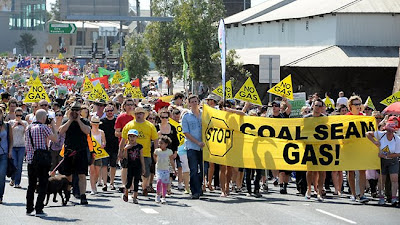Vanguard May 2012 p. 2
Nick G.
Nick G
 The Anangu Pitjantjatjara Yankunytjatjara (APY) Lands is a large area of over 102,000 square kilometres in the far North-West of South Australia.
The Anangu Pitjantjatjara Yankunytjatjara (APY) Lands is a large area of over 102,000 square kilometres in the far North-West of South Australia.
Approximately 2,500 Anangu (Aboriginal people) live on the lands.
Housing is over-crowded, health and education levels are low and food prices in community-run stores are often double those in other parts of the state.
One Aboriginal leader, who works closely with South Australian unions, expressed forcefully the bitterness of people unsettled by a continuing colonialist mindset.
“There is no question, as I see it, that the ongoing interventionist colonial agenda of 1788 currently pursued with gusto by Protector Macklin, Governor Gillard, Captain Abbott and the Rum Corps is creeping its way over the Lands and the economic weapon of starvation is being put to effective use. “
APY Land Rights Act vs “disturbance from others”
Anangu were given some measure of control over their affairs with the formation of the APY Lands through the APY Land Rights Act of 1981.
An elected local council operates over the area but it is based on European governance models and the last elections saw fewer candidates and a fall-off in votes cast.
Traditional authority is still exercised in APY communities by elders who are the custodians of law and culture.
(Amata, above, one of the remote communities just inside the SA-NT border, almost due south from Uluru)
Problems on the Lands are a convenient political football for the politicians down south. Every now and then a scheme is devised away from the Lands and imposed on the communities but with little effect.
In 1984, the High Court of Australia described the Act as: ‘a special measure for the purpose of adjusting the law of the State to grant legal recognition and protection of the claims of the Anunga [sic] Pitjantjatjara to the traditional homelands on which they live and as the legal means by which present and future generations may take up and rebuild their relationship with their country in accordance with tradition, free of disturbance from others’.
In fact, the “disturbance from others” is constantly visited upon the Anangu.
“We don’t want them seagulls,” said one elder. “Them white ones that just fly in, shit on us and then fly off again”.
“Co-production” aims to cut costs
The latest proposal, written in Adelaide, picks up on the jargon of “co-production” in the delivery of public services. The idea is that both parties, the providers of services as well as the recipients, are equal partners in defining the nature of the service and how and by whom it is delivered.
As a theory, “co-production” is fine, and there have been some good examples in Indigenous communities like Newcastle’s Birra-Li Birthing Service, established in 2000.
In a 2009 evaluation of the Birra-Li Birthing Service, its authors point out that “policy making and planning must always include Aboriginal representation from the outset”.
But that is not happening with the current plans to re-jig service delivery on the Lands.
Plans are being drawn up that reflect another of “co-production’s” aims: cost cutting. This is achieved, according to a study of “co-production of public services” from the University of Birmingham, “by making the user do more for themselves” and by involving the so-called “third sector” (voluntary organisations).
Then there is “centralisation of services” as has occurred under the racist Intervention in the Northern Territory. This amounts to de-funding homelands under the guise of facilitating better access to schools for children.
There is talk, for example, of merging the half a dozen or so schools scattered throughout the Lands into one super school - and this in an area equivalent to that which would include all the country between Adelaide and Mount Gambier as well as the Riverland!
However, there has been no mention to date of reintroducing bilingual education or of structuring school term times around Anangu timelines. Those initiatives might be culturally respectful but they might also cost money, so it is better not to consult genuinely with the Anangu communities.
FACSIA is slithering its way around communities cherry picking comments that will support them (divide and conquer) with their agenda in spite of being told time and time again that if they want to talk with people they do so in open forums at Umuwa.
Accountable to whom?
Government bureaucrats have the choice of writing policies on the Lands with Anangu representation from the start, or writing them in Adelaide where the dread hand of State Treasury rests heavily on the shoulder.
This is not good enough. It is not culturally respectful. It is not accountable to the Anangu. It will not improve conditions on the Lands.
Watch out for seagulls overhead….
















